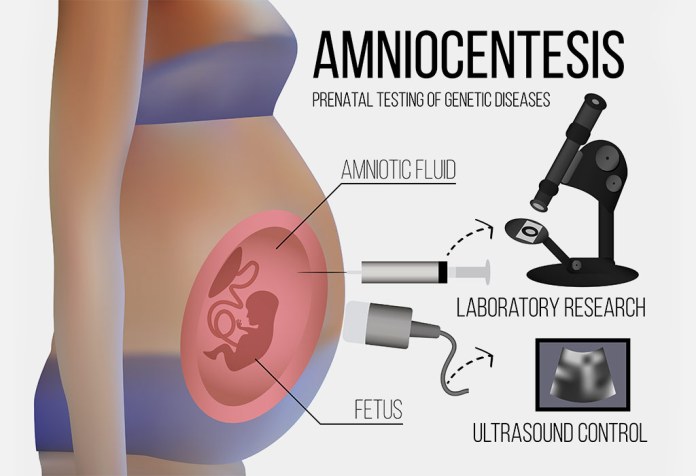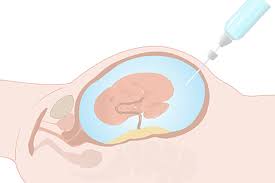Amniocentesis Test in India

What is Amniocentesis?
Amniocentesis is a specialized test that involves taking a sample of amniotic fluid from the uterus (womb). The fluid is then examined in the laboratory to determine whether your baby has any serious abnormalities.
It is a diagnostic test, which means it can tell with almost complete certainty whether or not your baby has a particular condition. As well as diagnosing chromosomal abnormalities, it can also tell whether your baby’s lungs are mature.
Key features of GO IVF SURROGACY
- The best consultation and counselling sessions
- Elevated assistances and procedures
- Highest Infertility Treatment success rates in India
- Many packages and other facilities for affordable Infertility Treatment cost in India
- Most skilled fertility and Infertility Treatment specialist in India
- Contact us: Info@IVFSurrogacy.in
- Call us: 91-989-929-3903
What Kinds of Abnormalities Can Amniocentesis Detect?
The test can identify several hundred genetic disorders, including some of the most common:
- Chromosomal disorders such as Down’s syndrome, trisomy 18, also known as Edward’s syndrome.
- Neural tube defects such as spina bifida and anencephaly.
Amniocentesis can also reveal whether you or your baby is rhesus negative (RhD negative). If a caesarean section is being considered, the test can determine whether your baby’s lungs are mature enough for him to be born. However, amniocentesis doesn’t detect every kind of abnormality. For example, it can’t tell about more physical abnormalities like cleft lip or palate.
Should I have an Amniocentesis / ask for it for My Surrogate Mother?
Amniocentesis is not a routine test. This test is usually done when there is a reason to suspect a chromosomal disorder such as Down’s syndrome. In general, you will be advised an amniocentesis if:
- you have had a ‘screen positive’ result from a blood screening test, indicating that your baby is at higher risk than usual of having chromosomal problems
- you have a family history of certain birth defects
- you have already given birth to a child with a genetic abnormality
- you have one or more relatives with a genetic disorder
- you need an early delivery and your doctor wants to test if your baby’s lungs are mature
Because amniocentesis is carried out in the second trimester, you may face a difficult decision if the test reveals a problem. You may need to consider the possibility that your baby will be born with a birth defect, or think about terminating your pregnancy. However, knowing in advance can give you the time to learn about the kind of help your baby will need if you decide to go through with your / surrogate mother’s pregnancy.
- When is Amniocentesis Done?
- How is an Amniocentesis Performed?
- Is Amniocentesis Painful?
Amniocentesis is usually performed in the second trimester, between 15 and 18 weeks of pregnancy. However, it can be performed as early as 12 weeks or as late as 20 weeks. Amniocentesis before 14 weeks has been shown to carry a higher risk of miscarriage.
By the second trimester there is enough amniotic fluid surrounding the baby to make it easier for the doctor to take an adequate sample without putting your baby at risk.
If your doctor is testing to see whether your baby’s lungs are mature, the amniocentesis test will be done closer to the date of delivery.
Using ultrasound for guidance, the IVF specialist will identify a pocket of amniotic fluid a safe distance from your baby and the placenta. She will then insert a long, thin, hollow needle through your abdominal wall and into the sac of fluid around your baby.
The doctor will use the needle to withdraw a small amount of amniotic fluid – about two tablespoons. This fluid contains cells from your baby, chemicals, and micro-organisms that can answer many questions about your baby’s health.
Guiding the needle to the right position using the ultrasound scan can take up to 20 minutes. Inserting the needle and withdrawing the amniotic fluid takes only about five minutes. Once the needle is out, you may have some tummy cramps.
The doctor will monitor you for a while to check whether you are having any uterine contractions and to listen to your baby’s heartbeat to make sure he has not become distressed by the procedure.
After the procedure of surrogacy is completed, the surrogacy legal aspect says that the surrogate will never meet the baby in near future and also the intended parents will never contact the surrogates for any reason. This aspect is as per the government of India because surrogacy is not an easy procedure for a woman who keeps a baby in her womb for 9 months and then she has no relationship with baby. So to run the process smooth and people continue enjoying their parenthood, this legal aspect needs to be considered.
What risks are associated with amniocentesis?
Amniocentesis is considered safe, but it is an invasive procedure. About 1 in 200 women will develop an infection or some other complication after their amniocentesis that results in miscarriage. Some women leak amniotic fluid or lose a small amount of blood from the vagina. In some very rare cases, the needle may touch the baby, leading to complications.
A high temperature, uterine contractions and/or tenderness, or feeling chilly and hot by turns indicate an infection. If you have any of these symptoms, contact your doctor immediately. Any leaking of amniotic fluid will probably stop of its own accord within a few days. You will probably be advised to rest in bed until it does.
If you’re not sure whether to have an amniocentesis, or if you’re very anxious about the procedure, talk about your concerns with your doctor beforehand. She will be able to give you all the pros and cons, and tell you exactly what will happen during your amniocentesis. She may also refer you to a genetic counsellor for more information.
Will I get the results of my amniocentesis straight away?
Unfortunately not. The sample has to be sent away to a laboratory to be cultured. It can take as long as two weeks to grow a sufficient number of your baby’s cells to reach a diagnosis. This can seem like a very long wait, and you may find it helps to keep busy during this time.
How much does amniocentesis costs?
The cost of the test varies in India. On your request we can take a quote from the hospital and send you for your consideration.
Why GO IVF SURROGACY?
To achieve success, you can pick the top Infertility Treatment clinic in India. We are aware that choosing a treatment and location can be difficult for couples. However, you no longer need to worry because we are here with the best techniques and treatments. The greatest treatment option is available for your infertility situation. What more will you receive from us?

- Treatment facilities and technology of the highest calibre
- Patients-centered approaches and methods
- Assistances for having affordable charges
- Well-built infrastructure for maximum comfort
- Every infertility treatment at one destination
- Highest success rates for Infertility Treatment and other procedures
- Contact us: Info@IVFSurrogacy.in
- Call us: 91-989-929-3903
GET FREE CONSULTATION
WHAT PATIENTS SAY ABOUT US

It was a great pleasure to visit Go IVF surrogacy, where the fertility experts help my husband by offering him the best procedure which is ICSI and after that procedure, we are able to have our own baby.
EMILY, UNITES STATES

Our great thanks to Go IVF surrogacy which offered us the best procedure which is IMSI as we already tried ICSI which not work for us, however, with IMSI we are able to take our baby home.
JOHN, UNITED KINGDOM

My all credit goes to Go IVF surrogacy for offering me with TESA/ PESA through which the fertility expert surgically obtain my sperm and fertilized with my wife’s egg to achieve the successful pregnancy.

